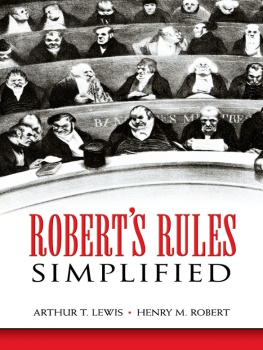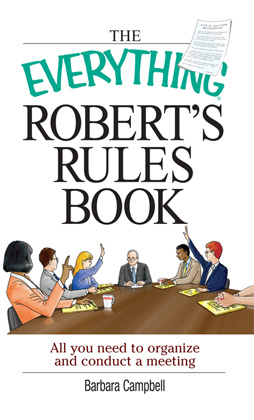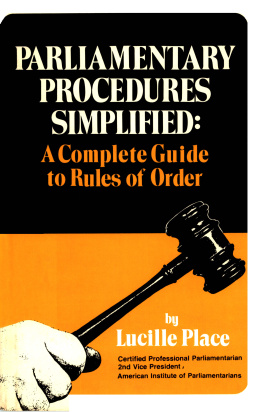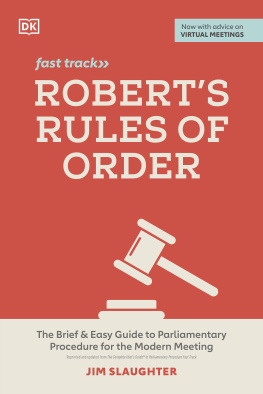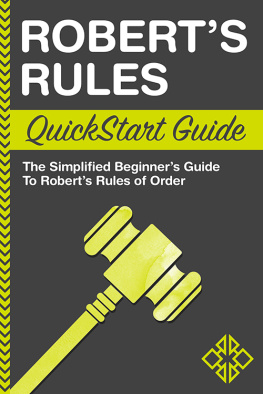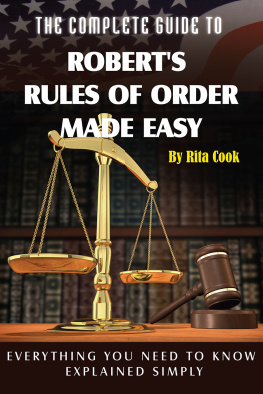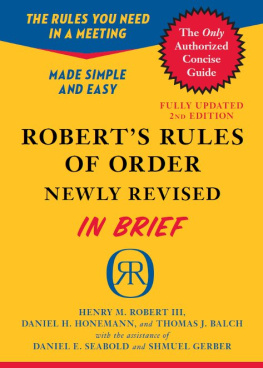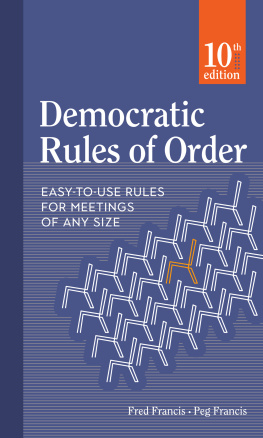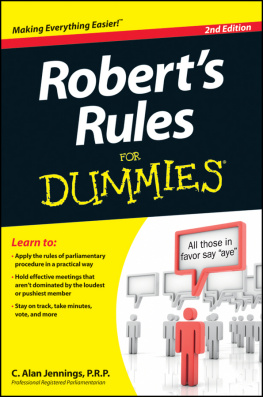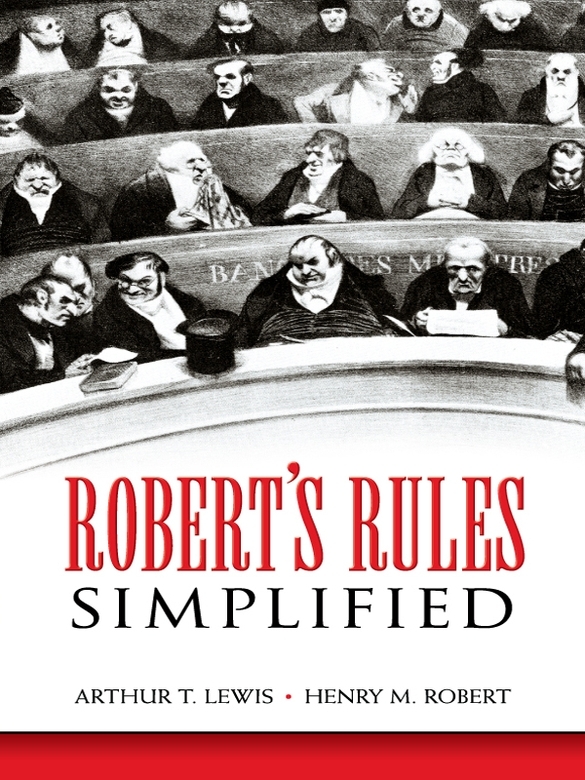The contents of this volume originally appeared as a series of articles in The Christian Science Monitor, and the author gratefully acknowledges the permission of that newspaper to reprint them. Gratitude is expressed also to Mary Redfield Plummer, a parliamentarian of many years experience and wide repute, for her invaluable assistance in reading the manuscript, and for her kind permission to use, from her work, The Double A Course in Parliamentary Procedure, the comparison of the nest of boxes. Finally, a word of appreciation to Mr. Herbert E. Thorsen, staff artist of the Monitor, whose illustrations serve so well to lighten the treatment as well as to enlighten the reader.
CHAPTER I
REASONS BEFORE RULES
P arliamentary Law is perhaps too often taken for granted by the members who enjoy its protection and use its privileges. Not understanding its reasons, they may think some of its provisions are difficult to comprehend. They settle down to make the best of itas they do the weather. They vote when the vote is called for, and at other times are prone to keep silent.
Another type of member may be suspicious of parliamentary law. To such a one, its rules are a bag of tricks with which a few members can run things to suit themselves.
Both attitudes are mistaken. In order that parliamentary law may be properly used and not abused, every member should understand its fundamentals, and every member can understand them.
Parliamentary law is more perplexing than difficult. If it seems hard to follow, the student may be trying to remember rules rather than to understand reasons. In the words of Thomas B. Reed, famed former Speaker of the United States House of Representatives: If the student has once fixed in his mind the idea that parliamentary law is not a series of arbitrary rulesbut a plain, consistent system, founded on common sense, and sanctioned by the experience of mankindhe will have gone far toward understanding it.
If you have difficulty in remembering all the various motionswhen they can be made, and when they are debatabledo not be discouraged. Begin with a few of the more commonly used motions. Endeavor to grasp the reason for themwhy they came to exist, why they are in order at some times and not others, why they usually require a second, why some can be discussed and not others. You can leave less frequently presented problems to be solved with the aid of a manual of parliamentary law. In fact, such a foundational knowledge will make you more expert in using a handbook of rules.
Fundamentals are more readily remembered than the rules which are based on them. The average citizen may know but few of the laws written on the statute books of his community or state but, as a rule, he is familiar with the Ten Commandments, which lie at the base of civilized codes. A knowledge of the Ten Commandments, and obedience to them, will result in a right course of action in any problem of human relationship. Similarly, a knowledge of the fundamentals of parliamentary law will usually enable a member of an organization to proceed correctly.
The many rules of parliamentary law are really applications to different situations of a few fundamentals. All law is founded on justice, and parliamentary law is no exception. Its foundation is justice to all: the member, the minority, the majority, the absentee, the organization. The great underlying rule is the Golden Rule.
As this basic fact is grasped, the entire structure of parliamentary procedure becomes the practice of obedience, self-control, courtesy and patience. Parliamentary law then becomes a fascinating subject for study and practice, full of interest, easily grasped.
The fundamentals of common parliamentary law may be many or few, depending on how they are stated. The following 12 are generally inclusive, yet brief enough to be easily remembered. These fundamentals and the rules based on them govern all deliberative assemblies, except where they may conflict with special rules adopted by an organization as part of its by-laws:
Twelve Fundamentals of
Common Parliamentary Law
1. The organization is paramount. To it belongs the power. Its interest and convenience supersede those of an individual member.
2. All members are equal. Each member has equal right to propose business, discuss it, and voterights which cannot be suspended or restricted save in the interest of the whole, and then only by a two-thirds vote.
3. One thing at a time. There can be but one main proposition before the assembly at one time. Only one member can have the floor at one time.
4. Full discussion before action. This applies to all main propositions and may be suspended only by a two-thirds vote.
5. Propositions rather than persons. The objective is the opinion and decision of the group upon the proposition, hence debate is impersonal.
6. Propositions may yield to privileges. Matters affecting the convenience or privileges of the assembly or an individual may interrupt consideration of a question.
7. No discussion for interruptions. Matters of sufficient urgency to interrupt discussion may not themselves be discussed.
8. No discussion for suspensions. Motions which have the effect of suspending a rule are not debatable.
9. No second time in the same form. To protect the assembly against waste of time, a question once decided may, as a general rule, not be presented again at the same meeting in the same form under similar circumstances unless a reconsideration is ordered.
10. The majority decidesusually. The majority decides all ordinary questions, but it requires more than a majority to limit a members parliamentary rights to introduce and discuss questions and vote, or to suspend or modify (without notice) a rule of order previously adopted.
11. Two-thirds vote for extraordinary questions such as motions to amend by-laws, to change or repeal (without notice) a motion previously adopted, to suspend the rules, or restrict the rights of members to introduce questions, discuss them and vote.
12. Silence gives consent. The right to vote must be exercised. Silence has the same effect as assent to the will of the prevailing side.
As succeeding chapters deal with parliamentary motions and the rules regarding them, reference to the above fundamentals will enable the student to see the reason for them. It will be seen that these fundamentals protect the individual against autocracy or minority rule; that the only restraint of the individual is in the interest of the whole; and that the supreme right of the group to transact its business in due order and with economy of time is fully safe-guarded.
CHAPTER II
HOW TO ORGANIZE
O ne never knows when one may be called on to take part in a mass meeting or aid in forming a permanent organization. A logical first question, then, is how to organize. The first steps are much the same whether organizing a mass meeting or a permanent society.
The call for the first meeting. The persons interested in having a mass meeting or in forming a new club, society, church, or other organization, should thoroughly discuss the preliminaries among themselves, and agree upon the place and time of meeting. They then notify others who also may be interested in joining with them and who are qualified. If it is to be a mass meeting, the notice may be published in the local newspaper. On the other hand, if it is preliminary to an organization with a restricted membership, the call would more probably be through personally delivered invitations. Robert says in his Parliamentary Law: The call may specify the class of persons invited and none other need be admitted.

